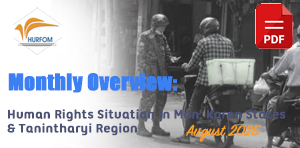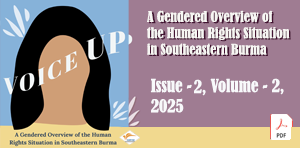2010 Elections Is Meaningless for the Mon People
May 4, 2010
After reaching the deadline of April 22nd, the New Mon State Party (NMSP) had to make a statement regarding their position on whether to accept pressure to transform their armed force into a militia force under the command of the Burmese army – since then the situation in Mon areas has been unstable. The troops of the Burmese Army have moved into or close to the 1995 ceasefire designated areas, and hundreds of Mon people have been displaced, escaping from their villages.
In actuality, the ruling regime’s 7 point roadmap to a “disciplined democracy” is not really intended to guarantee the rights of ethnic minorities that make up 60% of Burma’s territory. This roadmap is just to maintain the political power of the top commanders of the Burmese Army, those who have committed the most human rights violations against ethnic people when they were young commanders. Therefore the 2010 election is a special occasion to give legitimate power to the military commanders by officially allowing them to sit in parliamentary seats.
This begs certain key questions; What does this situation mean for the Mon people? Will the majority Mon people will be able to participate in elections? If there is a Mon political party, will they be able to win seats in the elections?.
In the situation when there is no majority population of Mon people to vote in this election, the voting process is meaningless. About 200,000 – 300, 000 Mon people living in the ceasefire zones have no national identity card and there under the new election laws have no right to vote. There are about half a million (500,000) Mon migrant workers are in Thailand, but because of their location have no right to vote.
As experience taught in the 2008 constitutional Referendum, the authorities and Burmese Army commanders took advanced votes of voters who were absent from their villages. The authorities put all these votes into the Yes vote to confirm the 2008 constitutional referendum. The SPDC appointed Election Commission (EC) is allowed to collect pre-votes or advanced votes and put them towards the government supported political parties.
After the elections, the military representatives who are appointed by the army Chief of Staff will sit in 33% of the seats and the other political parties will sit in the remaining 66%. In the election, the SPDC will also apply their support for their own pro-government political parties; the Union Solidarity and Development Association will transform to apolitical party and the National Unity Party (NUP) is already in Mon State and will contest against any possible Mon national political party. Many Mon political analysts think the SPDC’s two political parties will aim to secure Mon people’s votes, and will use many different techniques to get these votes.
Nearly 800,000 Mon people have no right to vote. The remaining Mon people in Mon State, Karen State and Pegu Division will not be able vote for any Mon political party because of this pressure and the real possibility of election fraud. Therefore, the slated 2010 election will be meaningless for the Mon people.
Comments
Got something to say?
You must be logged in to post a comment.



















































